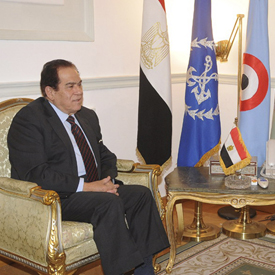Military appoint Egypt’s ex-PM to form cabinet
Former Egyptian prime minister, Kamal Ganzouri, accepts the ruling general’s request to form a new government.

The state newspaper, Al Aham, reported that Mr Ganzouri agreed in principle to lead Egypt’s new ‘national salvation’ government after meeting with the head of the ruling army council, Field Marshal Mohamed Hussein Tantawi.
The Supreme Council of the Armed Forces (SCAF) had accepted the resignation of the interim government, following five days of violence and unrest in Cairo and other major cities.
The SCAF pledged to continue with elections, due to be held next Monday, despite the violence, however some Egyptians are concerned that the military will seize power.
Mr Ganzouri headed the government from 1996 to 1999 under the ousted president, Hosni Mubarak, and had been named as a possible polticial representative.
Military apology
Earlier on Thursday, the SCAF also apologised for violent clashes with protesters that have left over 32 dead and around 2,000 injured, according to the health ministry
In a statement on its facebook page, the SCAF said it “presents its regrets and deep apologies for the deaths of martyrs from among Egypt’s loyal sons during the recent events in Tahrir Square.”
Pause in violence
Today marked a brief pause in violence, the first significant break since widespread unrest began on Saturday, as demonstrators agreed to stay put in the square.
However a ‘march of a million’ is planned for Friday. Thousands of demonstrators remain packed in the central square in protest at the deaths of over 35 people. They have vowed to stay until the military sets a firm date for the transfer of power to civilian authority, rejecting the army’s offer of a referendum on its rule.
Following the continued violence, Interior Minister Mansour el-Essawy presented a report to the military council proposing a postponement of the parliamentary election planned for 28 November, reports suggested.
Field Marshal Tantawi has pledged to bring forward a presidential vote.
Allegations of live ammunition
Several demonstrators have given accounts of people shot dead with live ammunition but these reports could not be immediately verified.
At a makeshift clinic near Tahrir, doctor Tareq Salem told Reuters four people had died there on Wednesday, two from bullet wounds and two from asphyxiation.
He added three volunteer doctors had been killed since the violence began.
“They were fresh graduates,” he said, splashing his face with saline fluid to counter the effects of the latest barrage of gas. One died of suffocation, the other two of bullet wounds sustained while assessing injuries outside, he said.
Egypt’s currency dipped to its lowest level in almost seven years on Wednesday and the yield on an Egyptian dollar bond soared to its highest since March, suggesting that investors are unconvinced that stability will return soon.
